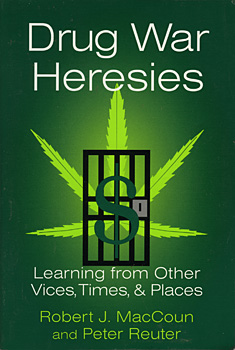
BACK COVER #
This book provides the first multidisciplinary and nonpartisan analysis of how the United States should decide on the legal status of cocaine, heroin and marijuana. It draws on data about the experiences of Western European nations with less punitive drug policies as well as new analyses of America's experience with legal cocaine and heroin a century ago, and of America's efforts to regulate gambling, prostitution, alcohol and cigarettes. It offers projections on the likely consequences of a number of different legalization regimes and shows that the choice about how to regulate drugs involves complicated tradeoffs among goals and conflict among social groups. BLURBS #
"This book appears just in time as the public keeps shouting at its leaders to ease up on their absolutist drug war. Written by two of the most knowledgeable analysts of drug policy, it provides the fullest analysis of the drug-policy problem yet to emerge. Drawing on historical experience in the US and contemporary innovation in Europe, it provides a careful blueprint for a drug policy based on reducing the harm of combatting drugs as well as the drugs themselves, and thereby avoids the horrors of strict zero-tolerance or those of full legalization."-- Alfred Blumstein, Past President, American Society of Criminology
"If you're happy believing what "everyone knows" about the drug problem and how to manage it, put this book down at once. If you're interested in the truth, take it home and read it. MacCoun and Reuter are knowledgeable, perceptive, relentless, and dispassionate. From now on, knowing what they have to say will be the price of admission to any serious discussion of drug policy."
-- Mark Kleiman, Author of Against Excess: Drug Policy for Results
"This is a superb book that should be required reading for every governmental official concerned with drug abuse policy. It is refreshing to read a book on drug abuse policy that uses data to reach conclusions rather than to justify preconceived views. Neither the drug legalization proponents nor the drug warriors are going to find much comfort in this book. It will hopefully, however, give the vast majority of us who are moderates in our views about drug abuse policy the data to demand changes in our current policies."
-- Charles R. Schuster, Former Director, National Institute of Drug Abuse

